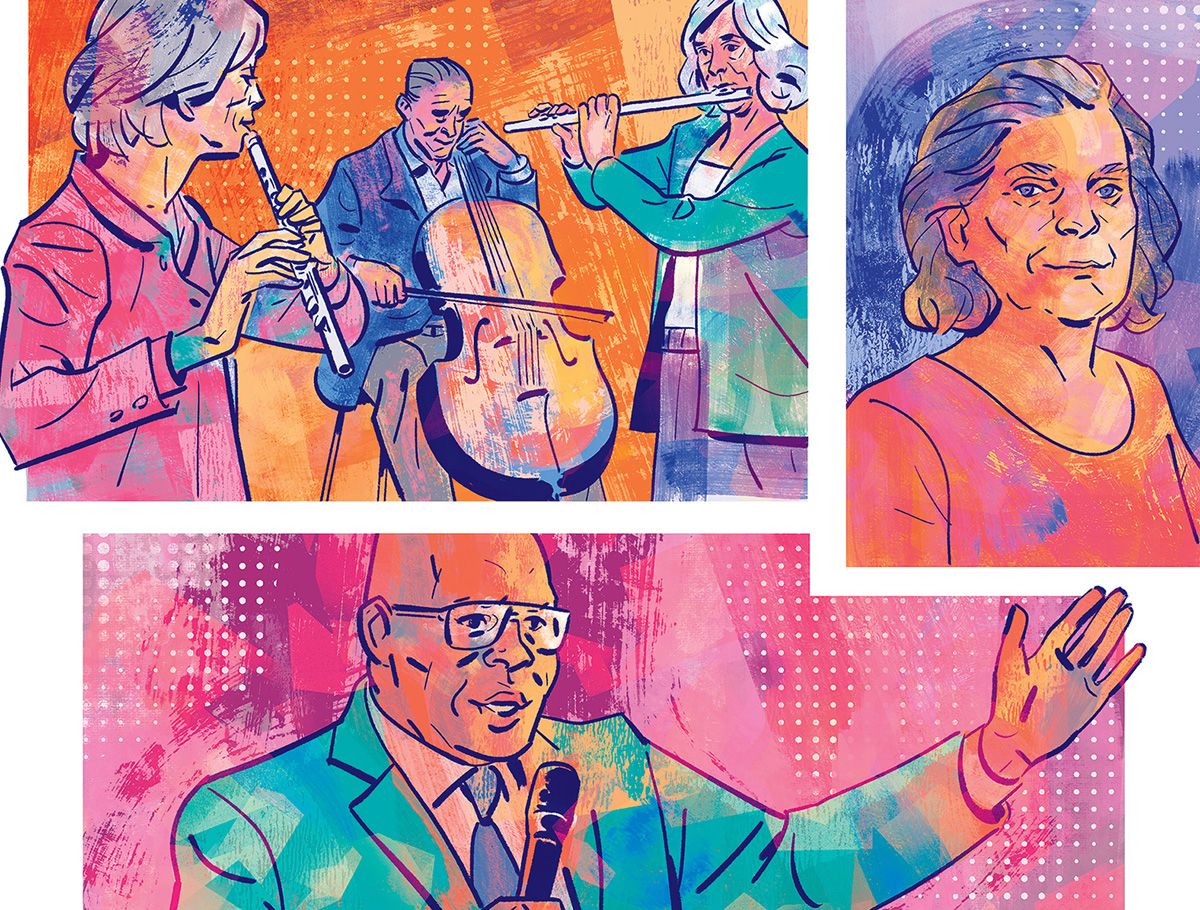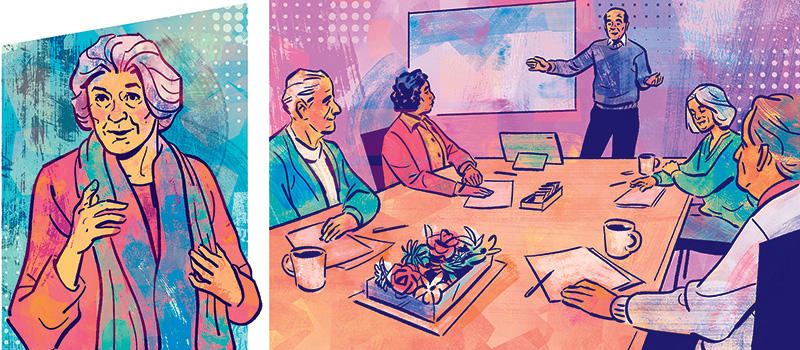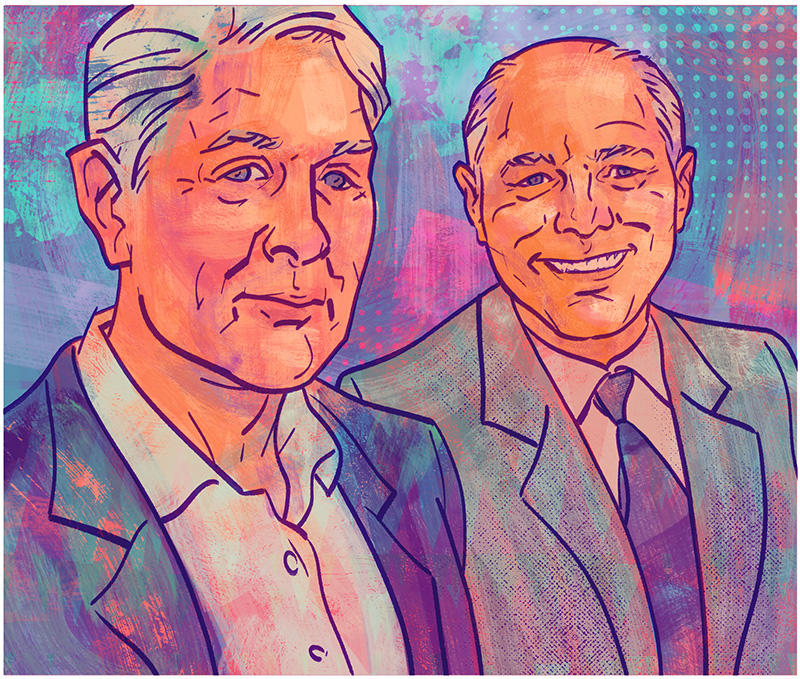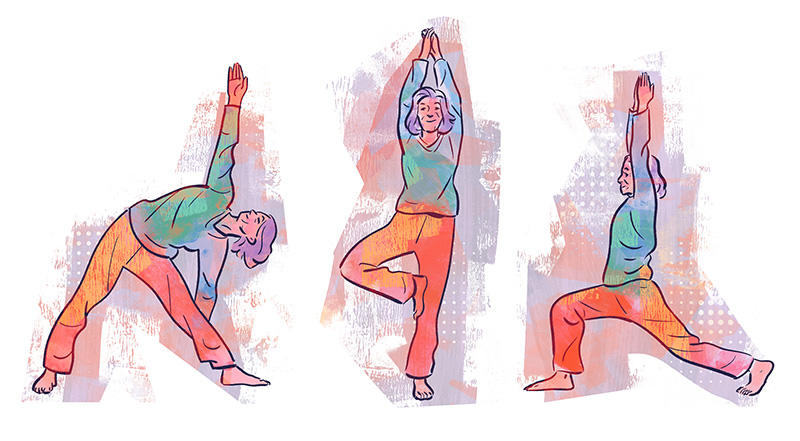
Stepping out of the prewar buildings of Riverside Drive, Broadway, and Claremont Avenue, the scholars strolled across busy intersections and sidewalks, negotiated the brick courtyard in front of Wien Hall, and arrived, just before noon, at Faculty House. There, Jeanne Stellman, a retired health-policy professor and the president of Emeritus Professors in Columbia (EPIC), welcomed colleagues who had arrived for the organization’s most anticipated talk of the year.
The speaker was Madeleine Kunin ’57JRN, the former Vermont governor, ambassador to Switzerland, and deputy secretary of education under President Clinton. Kunin’s latest book, Coming of Age: My Journey to the Eighties, held particular interest for the EPIC faithful. They listened as Kunin, eighty-six, her stately bearing accented by the swirl of blue in her white hair, recounted her extraordinary life: her family’s exodus from Switzerland when she was seven; her first job, as a newspaper reporter in Burlington, Vermont; her election in 1984 as America’s first Jewish woman governor (she served three two-year terms); her ambassadorship, marked by a hard-won fight to recover Jewish assets deposited in Swiss banks during World War II; her fierce commitment to feminism; and her ongoing efforts to recruit women to run for office.
She also talked about aging: finding late love, suffering late loss, downsizing to a smaller living space, discovering a passion for poetry, and feeling “liberated” in her seventies after withdrawing from public life. “I didn’t have to dress a certain way. I didn’t have to speak a certain way,” she said. “It’s as if I opened a new door.”
The professors emeriti could relate. They’d gone through doors, too, some of them reluctantly, not knowing what could possibly follow careers that so perfectly assimilated their most avid interests. How, exactly, do you retire from a life of the mind? How do you leave the classroom when there is no mandatory retirement age?
EPIC, which is run out of the Office of the Provost, understands such questions and works to smooth what many acknowledge is a difficult transition. With 150 dues-paying members and a thousand-person mailing list, EPIC offers retired Columbia faculty and administrators the opportunity to join a family of wide-ranging thinkers and practitioners who pool their knowledge and learn from one another as they navigate life outside the classroom. “It’s the kind of place where you’ll have a neuroscientist talking to a Russian scholar about the Big Bang,” says EPIC vice president Lou Cleveland ’67GS, who taught in the microbiology department at Columbia University Irving Medical Center (CUIMC). According to Cleveland, that sort of interaction is a “spectacular benefit,” since he believes that the biggest source of anxiety for older academics isn’t decreased mobility or hearing loss or any other trick of aging. Rather, it’s the prospect of loneliness. “Intellectual companionship in retirement,” he says, “is very hard to find.”
The word “emeritus” first appeared as an honorific for retired academics and clergy in the eighteenth century. It comes from the Latin verb emereri, meaning “earn one’s discharge by service,” a reference to Roman soldiers who had completed their term. On a Thursday morning, a cadre of Columbia emeriti — or EPICureans, as they call themselves — gather at the new EPIC headquarters in room 202 of Philosophy Hall. It’s a modest, tidy spot with exposed brick, a sofa and chairs, and a desk behind which Diana Dumitru, assistant director of faculty retirement and EPIC’s lone employee, is securing spaces for EPIC’s well-attended talks. With square footage at a premium at Columbia, the new office is a strong show of support from the University. “It’s easier to get this much gold than to get this much space,” says Frances Pritchett, professor emerita of modern Indic languages in the Department of Middle Eastern, South Asian, and African Studies. A scholar of the Urdu and Persian poet Ghalib, Pritchett calls herself “part of the radical humanist minority” in EPIC, which brims with physicians and researchers from the medical campus uptown.
For Stellman, the “downtown” campus, with its landscaped quads and marbled libraries, holds an exotic allure. “The faculty and the discussions are so different than at the medical campus, where we’re very applied and the pace is much faster,” she says. “It’s fascinating for us to experience a part of Columbia totally unlike where we spent our careers.”
Stellman was born in a relocation camp in Germany and raised in Far Rockaway, Queens. She holds a doctorate in physical chemistry and is known for her long-term studies on herbicide exposure and combat PTSD in Vietnam veterans. With those veterans now in their seventies, Stellman has become more attuned to the public-health aspects of aging, including retirement. It’s an interest that informs her work at EPIC: what happens to people when they are separated from the careers that seemed to define them?
Years ago, when Stellman was doing a health study of shipyard workers in Chester, Pennsylvania, she witnessed a scene that stamped itself on her mind. “There was a man in his sixties who was retiring. On his last day at the job, he left in a state of shock. After forty years at a shipyard there should be bells and whistles, but there was nothing: he just walked out with his stuff.”
Stellman wants to avoid such tableaux in academia: the retiring professor who, after the desk is cleared and the photos taken down and the books and tchotchkes emptied from the shelves, becomes disconnected from the institution. EPIC ensures that retirees remain in step with the rhythms of University life. “Once you no longer have the structure of work, you have to figure out what to do with your time,” Stellman says. “EPIC is a way of continuing intellectual involvement and socializing here at Columbia.”
The benefits of intellectual fellowship, wherever it’s found, aren’t just social. They are also medical. Columbia neuropsychologist Yaakov Stern studies “cognitive reserve” — the idea that some people can cope with age-related changes in the brain better than others. Using behavioral studies and functional MRI, Stern has found that the brain, in undertaking stimulating activities (school, a challenging job, a hobby), accrues a fund of resiliency against age-related decay. Brain imaging indicates that some people have more reserve in old age than others, and use it more efficiently. “Factors associated with more reserve are higher educational and professional attainment, leisure activities, and strong social networks,” Stern says. “These experiences develop more robust cognitive networks that allow older people to function better.”
EPIC also recognizes the link between cognitive function and physical exercise. Ginny Papaioannou, emerita professor of genetics and development, took up yoga in her sixties, got her certification as an instructor, and now leads two EPIC yoga classes per week. “Many older people become very inactive physically,” Papaioannou says. “That’s partly because the exercise culture — running, aerobics — is designed for young people. As you age you have to make accommodations. Yoga was a way for me to do that. And I felt it was something I could offer to EPIC.”
In classes held in Faculty House, Papaioannou emphasizes poses that improve strength, balance, and flexibility. A weekday morning can find ten EPIC members in leggings and T-shirts stretched out on mats while the teacher’s laptop emits a pan-flute rendition of “Sukiyaki,” accompanied by Papaioannou’s soothing voice: Relax your shoulders … Notice your breath … At the yogi’s command, the retirees roll over and curl up. Be grateful for one another’s company.
Be grateful, too, that you are also nourishing your brain. Last year, Ottavio Arancio, professor of pathology and cell biology at Columbia, published a paper with colleagues on the hormone irisin, which is released into the bloodstream with physical exercise. The study found that irisin, which is depleted in the brains of Alzheimer’s patients, may play a role in protecting the brain from the effects of the disease. In experiments, mice that swam every day — producing more irisin — could withstand infusions of beta-amyloid, the sticky protein thought to be the cause of Alzheimer’s. And this year, Yian Gu, assistant professor of neurological sciences, coauthored a study suggesting that brain shrinkage, a common occurrence in adults over sixty, may be prevented with physical activity. Using MRI, the study examined the brains of 1,500 people with an average age of seventy-five and found that subjects who engaged in activities ranging from light (walking, gardening) to vigorous (jogging, handball) retained more brain volume than those who were inactive.
EPIC likes to mix learning with lunch, and a menu of recent EPIC events suggests a smorgasbord of Michelin-grade nibbles for the hungry mind. At one of the Tuesday Talks held every other week during the school year, you might hear Michael Rosenthal ’67GSAS, emeritus professor of English, discuss his book on Grove publisher Barney Rosset; or emeritus law professor Peter Strauss speak on presidential authority and the Constitution; or Kenneth Prager ’64CC, chair of the medical-ethics committee at CUIMC, explore end-of-life ethics for clinicians. In EPIC Conversations, organized by emeritus history professor Volker Berghahn and, like most EPIC talks, streamed live on EPIC’s YouTube channel, you could listen to emeritus urban-planning professor Elliott Sclar examine the politics of mass transportation or emerita history professor Alice Kessler-Harris dissect the politics of Lillian Hellman ’76HON.
Once a month, a PhD candidate or postdoc delivers a lecture to EPIC members on a specialized topic in history, medicine, music, or literature. In addition to informing those in attendance, these talks allow graduate students to shape their material for an erudite general audience.
Joshua Navon ’19GSAS, a thirty-one-year-old musicologist and lecturer at Columbia who studies German classical-music pedagogy, gave a talk on the educational and scientific contexts that led to the idea of musicality as a universal human capacity. For Navon, presenting his work to people outside his field forced him to write less technically and helped him clarify his arguments.
“The questions from the EPIC audience were some of the most thoughtful I’ve ever received,” he says. “It’s an important reminder that academia isn’t all about playing the game and trying to get a tenure-track job — there are people who are genuinely interested in intellectual work for its own sake.”
It’s a reminder, too, that many EPIC members can still command a classroom. That they have chosen to step down speaks to EPIC’s role in the Columbia ecosystem: with no mandatory retirement age, voluntary departure is a critical driver of faculty regeneration.
“Scholarship needs to be cutting-edge, and I think it is best left in the hands of younger people,” says Frank Wolf ’71GSAS, dean emeritus of the School of Professional Studies. Says Pritchett, “It’s Columbia’s nightmare that we’ll stay on till we’re ninety, repeating the same old things and not making room for new people. So the administration wants us to be happy and wants to provide a psychological home for future retirees.”
When Samuel Devons founded EPIC in 1999, he already embodied the ideal of the active, engaged emeritus. Born in 1914 in Wales, the son of the village rabbi, Devons trained at Cambridge, became a celebrated nuclear physicist, and in the 1960s served as chair of Columbia’s physics department. After retiring in 1984, he kept both thumbs in the pie of academic life, organizing seminars on science education and giving historical talks on Isaac Newton and Benjamin Franklin. He envisaged EPIC as a way for retired professors to remain rooted in the University.
“Sam was one of few people in the natural sciences I knew of who had very broad interests beyond his own discipline,” says Wolf. “His notion was to bring people together from the arts and humanities and the sciences. It started out as club of mandarins. It wasn’t an organization you joined, it was an organization you were invited to join — if you were eminent enough.”
“Most of the lectures at that time were from a small group of emeritus professors giving talks on esoteric topics,” says Carolyn Greenberg, professor emerita of anesthesiology and head of EPIC’s music initiative. “Now there is a much broader range and greater participation.” In 2004, Seymour Topping, professor emeritus of journalism and former managing editor of the New York Times, became EPIC president. Under Topping, who served as administrator of the Pulitzer Prizes at Columbia for ten years, EPIC opened itself to retired Columbia administrators as well as faculty, widening its scope and boosting its membership. Wolf got involved in 2013, when Robert Belknap ’57SIPA, ’59GSAS, a renowned professor of Russian literature who succeeded Topping as president, asked Wolf to give a presentation for EPIC’s Tuesday Talks. “But Bob,” Wolf said, “those talks are by scholars, and I’m an administrator.” When Belknap asked him what he was doing in retirement, Wolf told him he was running a small charity called the Child Welfare Fund. “Why not talk about that?” Belknap said. So Wolf did.
After Belknap’s death in 2014, Doug Chalmers, a professor emeritus of political science who joined EPIC in 2005, asked Wolf to organize the Tuesday Talks. He and Wolf were old friends, and he knew that Wolf’s charisma would bring new energy to the group.
Chalmers is special assistant to the provost for faculty retirement. His job is to visit older professors and advise them of their rights as retirees. He talks about health insurance and housing; access to courses, buildings, and e-mail; computer and gym discounts; and negotiating for benefits like workspace availability, teaching opportunities, access to labs, and support for grant applications.
When he first started in the role, Chalmers was struck by the way many professors described their feelings about retiring. They compared it, he says, to “falling off a cliff.” They had no plans, no road map, no conception of life outside their fortresses of books.
“Even today,” says Chalmers, “many people don’t think of retirement as a time to do things.”
“We never designed a society for longer life,” says gerontologist Linda Fried, dean of the Mailman School and a leading theorist on aging. “Over the past century, life expectancy has risen by thirty years. The modern professoriate was established when life expectancy was forty-seven; no one was thinking about the immense asset of mature scholars. People are now healthier and have longer lives, and we have an opportunity to enable new kinds of roles that contribute to the greater good. Our society just can’t afford to lose all that knowledge and capability.”
Chalmers agrees. When he became EPIC president in 2015, he was determined to deploy older academics into the neighborhood beyond Columbia’s gates. Needing help, he called Margaret Jo Shepherd, emerita professor at Teachers College. In 2016, Shepherd and Stellman, the new EPIC president, met with George Calderaro, director for outreach programs at the School of Professional Studies (SPS), and Ron Bruno, social-service director at Morningside Gardens, a thousand-unit cooperative near La Salle Street and Amsterdam Avenue. The meeting resulted in a lecture series called EPIC/SPS Community Programs.
Each spring, about five talks, free and open to all, are held at Morningside Gardens and consistently draw around forty people. Recently you might have heard Ferdinand Ofodile, emeritus professor of surgery, discuss his experience working with African diaspora groups to provide medical aid in Africa and the Caribbean; or listened to Columbia musicology professor Walter Frisch unravel the song “Over the Rainbow.” Frisch recounted the trouble that lyricist Yip Harburg had in finding the opener for composer Harold Arlen’s tune: “Harburg says, ‘He gave me a tune with those first two notes,’” said Frisch, adding that the octave leap is not easy to sing. “Harburg says, ‘I tried I’ll go over the rainbow, Someday over the rainbow, or The other side of the rainbow … For a while I just thought I would leave those first two notes out.’” A good job he didn’t, Frisch said. Finally, thankfully, Harburg landed on Somewhere.
Mental stimulation and exercise may be important to healthy aging, but more fundamental still, according to Fried, is having a sense of purpose. The impulse to positively affect the future persists after retirement, Fried says, and that drive is part of what she means when she speaks of harnessing “the social capital of older adults.” Her signature project is Experience Corps, a volunteer program administered by the AARP Foundation in which retirees become mentors for at-risk schoolkids.
Mentoring, of course, is baked into a professor’s DNA, and under Stellman, EPIC is building its own program. In partnership with Columbia’s Justice-in-Education Initiative, which is supported by the Andrew W. Mellon Foundation, EPIC pairs emeriti with formerly incarcerated Columbia students. Ginny Papaioannou was among the first to sign up. She has worked with two students: a woman who spent eighteen years in prison and was working as a law-firm intern while taking classes, and a man who was trying to set up a credit union in Harlem for what advocates call “returning citizens.”
The mentoring is informal and agenda-free; mentors are encouraged to take mentees to lunch at Faculty House to foster a sense of belonging to the Columbia community. Some go further: Daniel Thys, emeritus professor of anesthesiology and organizer of the graduate-student talks, took his mentee to the opera.
Fried often speaks of the need in mature age for “a reason to get up in the morning.” Columbians tend to meet this need through a mix of altruism and personal development. Madeleine Kunin took up poetry. Thys is studying music theory. Some are writing books, painting pictures, volunteering, working part-time, and making use of the Dodge gym and Butler Library.
Still others, like Carolyn Greenberg, who taught and practiced anesthesiology at Columbia for thirty-two years, are reviving old passions.
Greenberg took her first piano lesson at age seven and continued until college. But the demands of medical school — and then a career and three kids — pushed music to the background. Only when she left medicine entirely in 2007 did she take it up again.
“I was very rusty,” Greenberg recalls. “I found a Juilliard-trained teacher, and he said it would be about a year before I would get good enough to audition.”
A year later, Greenberg tried out for the chamber-music group at the 92nd Street Y. She got the gig. “It was a real adjustment,” she says. “Chamber music is very different from solo piano. It requires a lot of sight-reading, and luckily I’m pretty good at it.”
Two years ago, Greenberg, who showed up sporadically at EPIC events, approached Stellman with an idea. Knowing that many retirees played instruments, Greenberg wondered: could EPIC bring people together to make music?
Stellman was all for it. The first “play-in” was held at Greenberg’s apartment. Turnout was small — a vocalist, a flutist, a clarinetist, and Greenberg. The group had dinner and then played for two hours. Months later, Wolf, a clarinetist, hosted a play-in at his Claremont Avenue home. This time, a dozen people came. “It was delightful,” says Greenberg, “but then we ran into difficulty finding a venue for a subsequent event.”
Finally, Diana Dumitru located the perfect spot: Earl Hall.
“There’s a grand piano upstairs, and it’s an absolutely beautiful place with wonderful acoustics,” Greenberg says.
With little foot traffic on Saturdays, the musicians — pianists, oboists, violinists, flutists — can play unhindered. At the last gathering, fifteen people showed up. There was a Beethoven septet, a Schubert quartet, and a Bach trio. “The quality of the musicians in the EPIC group is very high,” Greenberg says. “Everyone has had experience with chamber music, and some play regularly — it’s not a beginner’s group by any stretch. I believe we could hold our own with music majors.”
One of Greenberg’s dreams is to join forces with Columbia’s music department for a play-in with students. “It would be an all-Columbia, intergenerational event,” Greenberg says. “That would be great fun.”
Ambassador Kunin had woven some poems, intimate and elegiac, into Coming of Age, and moderator Wolf asked her to read one. The audience in Faculty House listened as Kunin read “No Longer.” “No longer will we make love / before breakfast. / No longer will I dream / of seeing New Zealand / or the Cape of Good Hope,” the poem began. Later in the talk, when Wolf delicately begged Kunin to read another poem, Kunin eagerly reopened the book. “You don’t know how the ego is gratified,” she said, and the audience laughed. They knew.
Afterward, Kunin signed books, and then everyone proceeded to the white-linen-covered tables for lunch. Familiar faces were all around: Chalmers and Shepherd, Cleveland and Pritchett, Greenberg and Thys, Stellman and Papaioannou, whose yoga-class mantra echoed beneath the din: Be grateful for one another’s company.
Friends sipped wine and shared stories; and when the plates were cleared and the glasses drained, the Columbia emeriti got up, said their goodbyes, and filed out through the doors of Faculty House, into the arms of the afternoon.
EPIC suspended activities in March due to COVID-19. Live events will resume as soon as possible, while online programming will continue for less mobile members.
This article appears in the Spring/Summer 2020 print edition of Columbia Magazine with the title "An Epic Adventure."





